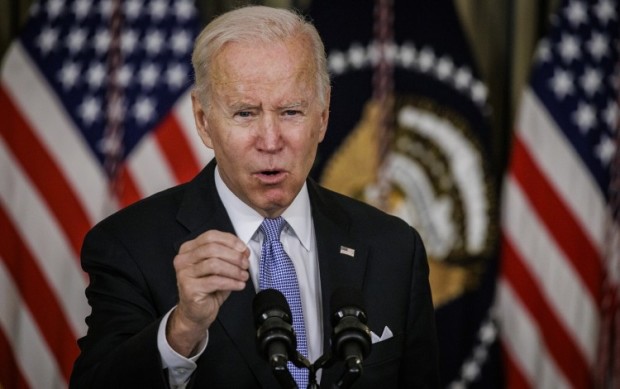
When President Joe Biden finished his test run of Ford's (F) -) F-150 Lightning back in May of 2021, he couldn't wait to share his thoughts with reporters.
"This sucker's quick," he said.
DON'T MOVE: Tesla Rival Kia Has Awful News About Its Electric Vehicles
Biden, sporting his classic aviator shades, drove the electric truck through an empty lot, before telling reporters it "feels great" to be behind the wheel and answering, "I would," when asked if he would buy one.
Electric vehicle adoption has been major issue in the Biden Administration.
The Environmental Protection Agency (EPA) in April proposed rules that could result in as much as two-thirds of the new vehicle market shifting to EVs by 2032.
The rules would eliminate the equivalent of carbon dioxide emissions generated over two years by all sectors of the U.S. economy.
And last month the administration said it intended to invest $2 billion from last year's Inflation Reduction Act to accelerate domestic manufacturing of electric vehicles and resuscitate plants that are struggling.
Scarcity of Materials
However, there has been resistance to the administration's aggressive environmental steps.
The Alliance for Automotive Innovation, which represents General Motors (GM) -), Stellantis (STLA) -), Toyota (TM) -) and others, called the EPA proposal a "de facto battery electric vehicle mandate" that was "neither reasonable nor achievable."
Tom Stricker, Toyota’s group vice president, said that while the company “shares the objective of reducing carbon as much as possible, as soon as possible” the current target is not feasible.
"The Proposed Rule underestimates key challenges including the scarcity of minerals to make batteries, the fact that these minerals are not mined or refined in the U.S., the inadequate infrastructure, and the high cost of battery-electric vehicles," Stricker said, according to The Daily Mail.
"Automakers need time to invest in EV and battery production capacity, for the charging infrastructure to develop across the country, and for the market to mature," Stricker said.
Stellantis said the rule “significantly underestimates” the complexities of building a viable EV market.
Biden is also getting pushback from organized labor, which is unusual for the Democratic president who has been a longtime ally of labor.
Pushback from Auto Workers
The United Auto Workers' new leadership has sounded alarms in recent weeks about the push toward electric vehicles, the Washington Post reported, criticizing the relatively low pay workers are earning at one new battery factory and blasting the closure of older gasoline-vehicle factories.
Union officials want to known why the government is using billions of taxpayer dollars to subsidize battery and EV factories without requiring strong pay.
If progress isn’t made on the multiyear contracts covering roughly 150,000 UAW workers, some plants could go on strike as early as September.
UAW President Shawn Fain, who was elected in March with a remit to reinvigorate the union, has gone so far as to withhold the UAW’s endorsement for Biden’s reelection campaign.
Fain reportedly told his members in a memo that the union first expects the White House to help it ensure that workers win strong pay and job security in the EV era.
“We’ll stand with whoever stands with our members in that fight,” Fain wrote in May. “The federal government is pouring billions into the electric vehicle transition, with no strings attached and no commitment to workers … We want to see national leadership have our back on this before we make any commitments.”







